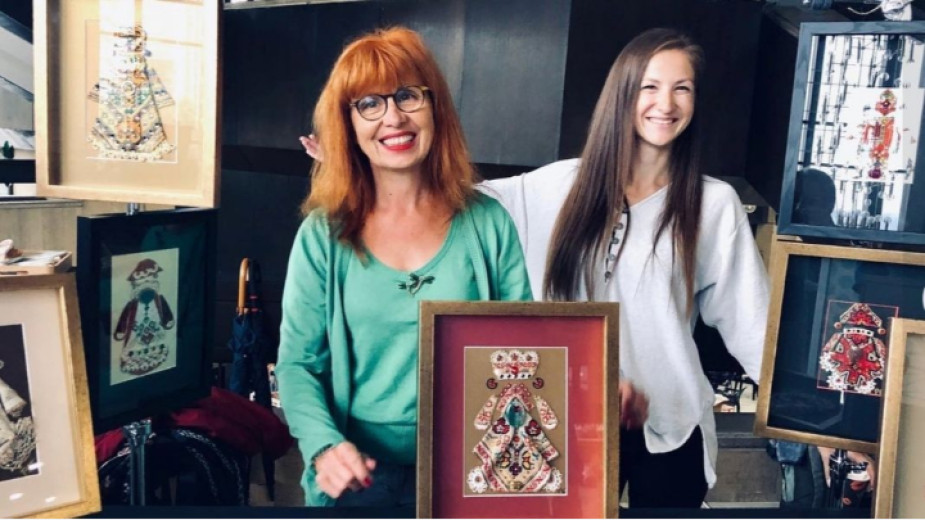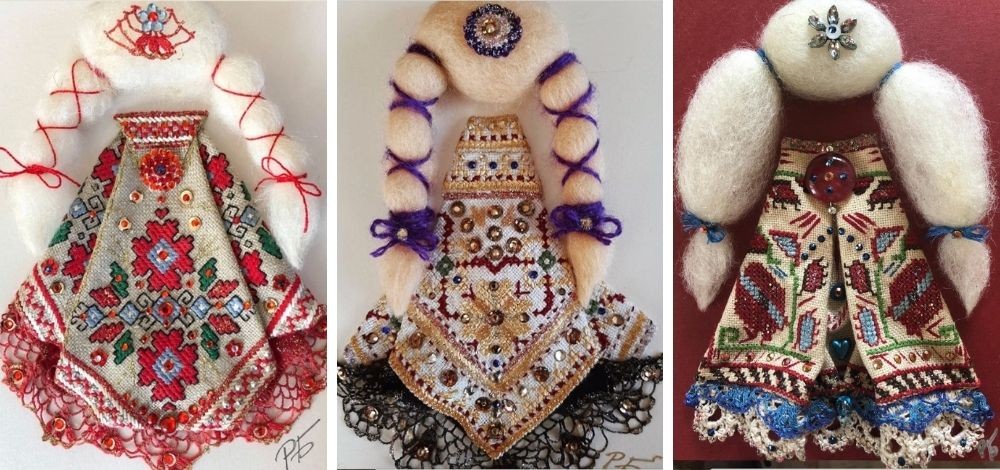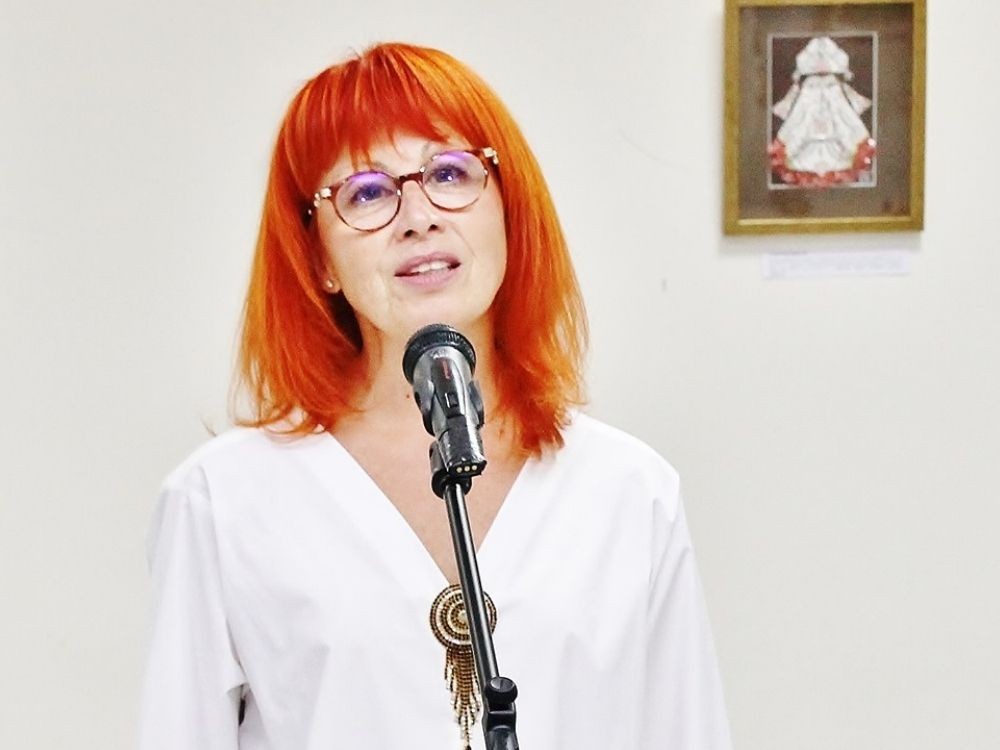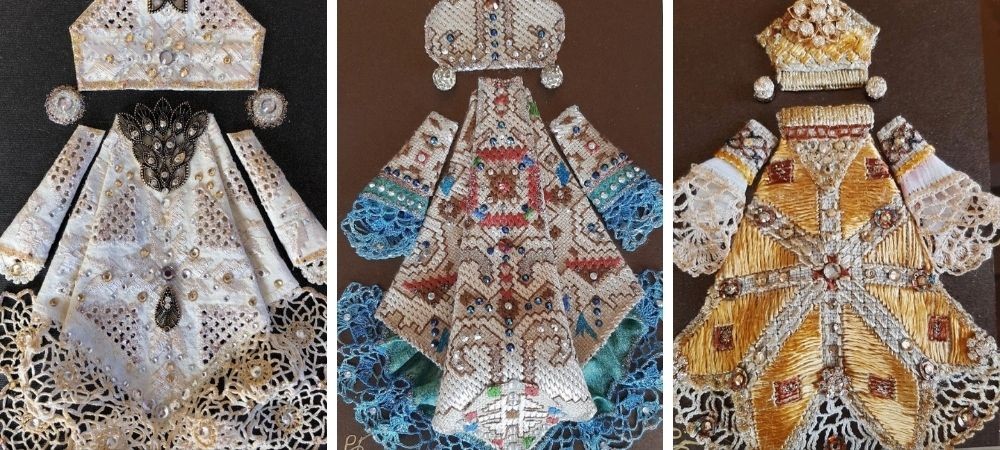 4
4
Veneration, sacrament, mystery - everyone can choose the most appropriate word for the emotion they experience when opening their grandmother's treasure chest. Touching the canvas woven by her hands, we seem to feel the energy of a distant time, we seem to read magical visions in the figures, and recall memories of the clear sky, the gold-strewn fields, the scarlet cheeks of an infant sleeping in its cradle.
Vardarki - this is how Rumyana Beleva calls the creatures she makes from the treasures she finds in her grandmother's chest and puts them behind glass like real jewels. She came up with the name “vardarki” not only because her mother's surname was Vardarova, but also because of its closeness to the verb "vardya" (protect, keep), which embodies the idea of keeping, safeguarding. Thus, through knitted lace, embroidered motifs and decorations, she creates female guardians, transferring to our days the traditions of the past.

"I grew up in such an environment – I was always surrounded by my grandmothers and aunts who were sewing and knitting," Rumyana Beleva recalls. “And since I have been exposed to embroidery for a long time, I decided it was time to present it in some more elegant way in our modern lives. I made the stylized female figures of the “Vardarki” with admiration for the Bulgarian woman as a guardian of sacred knowledge and wisdom. The Bulgarian woman had knowledge of space, of nature, she lived in harmony with the world around her. And after her day was over, she passed on her impressions through embroidery, uttering blessings for health and prosperity. The embroideries encode a strong energy that protects the home. ”

Rumyana Beleva believes that even today we can feel the messages of those women who with their hearts, while working, were uttering wishes for health and well-being.
"The master Petar Deunov* says that thousands of souls are hidden in the art of embroidery,” says Rumyana Beleva. "Indeed, these are the souls of the women who made them, of the women who will preserve them and pass them on in their authentic form. There is magic in everything - in the making of the embroidery, in its messages. It is no coincidence that the embroideries in the garments of the Bulgarian national costume were placed in certain places, as they performed an apotropaic (protective) function, which is the other meaning of the verb "vardya". The embroideries were placed on the skirts, on the sleeves, on the collars, because the ancient people believed that that was where evil came from and where evil energies entered the body.”

Rumyana Beleva develops her stylized images in four thematic lines. The ethereal Angels are made of lace with silk threads, while the long hair of the Braids are twisted out of natural wool. The Sevastokratorki inspired by the frescoes in Bulgaria’s emblematic Boyana Church with the wife of Sevastocrator Kaloyan - Desislava, look regal in their garments decorated with beads, earrings and brooches.

Although made with materials from bygone times, the Vardarki are modern creatures, their author believes. But how much have we changed and how have traditions, superstitions, beliefs transformed today?
"We have not changed much and we are currently witnessing a revival," Rumyana Beleva argues. “People are awakening and feeling the need to go closer to their roots by wearing national costumes, by touching embroidery and lace. And the roots are our genetic memory - they are where the soul has chosen to be born. "
English version Rositsa Petkova
Photos: Facebook /Vardarki
* Peter Deunov (aka Beinsa Douno) was a Bulgarian spiritual leader, preaching a healthy lifestyle based on love and respect for nature. He lived in the period 1864-1944 and was defined as "the greatest philosopher in today's world" by Cardinal Angelo Roncalli, nuncio of the Vatican in Bulgaria, and later Pope John XXIII. Every year, followers of Peter Deunov from Bulgaria and different parts of the world gather near Kidney Lake, one of the seven Rila lakes, in Bulgaria’s Rila Mountain. There the members of the so-called "White Brotherhood" perform the Paneurhythmy bequeathed by Deunov - a system of physical exercises performed to music and combining movement, speech, thought and the influence of the natural environment.
Bulgarian dance ensemble “Jantra” from Budapest will participate in the fourth edition of the International Folklore Festival “BalkanFolk”, which will be held in early October in Palma de Mallorca, BTA has reported. The initiative..
The heart and rhythm of the Bulgarian spirit – with these words we can metaphorically define the National Festival of Bulgarian Folklore. Traditionally, since the distant 1965, the event has been organized once every five years on the first weekend of..
The number of Bulgarian folk dance ensembles abroad is growing and, alongside Bulgarian schools, they are among the key centres that unite compatriots overseas and preserve their connection to their roots. Recently, some of these dance troupes returned..
Bulgarian dance ensemble “Jantra” from Budapest will participate in the fourth edition of the International Folklore Festival..

+359 2 9336 661
